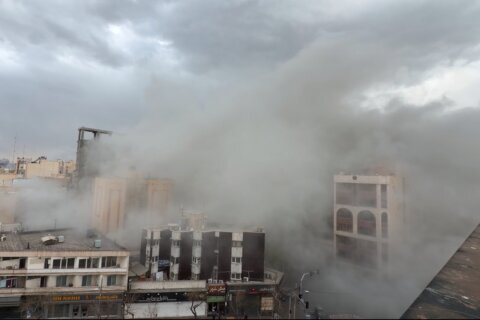WASHINGTON – “Measured and thoughtful” is how Director of National Intelligence James Clapper describes the changes in U.S. intelligence gathering that President Barack Obama has ordered.
“The reforms he announced today and those that are under consideration are focused on striking the right balance between making sure we have the tools necessary to conduct intelligence, that we are being as transparent as possible and that we’re not violating the civil liberties and privacy of innocent Americans,” Clapper said.
During his speech Friday morning, Obama invoked the name of Revolutionary War hero Paul Revere and his contemporaries, as he reset the role of the National Security Agency in conducting surveillance.
“Throughout American history, intelligence has helped secure our country and our freedoms. Throughout this evolution, we benefited from both our Constitution and traditions of limited government,” Obama said.
“U.S. intelligence agencies were anchored in our system of checks and balances, with oversight from elected leaders, and protections for ordinary citizens.”
But he admitted that in the aftermath of Sept. 11 and the new laws and orders aimed at improving U.S. intelligence collection, “the risks of government overreach – the possibility that we lose some of our core liberties in pursuit of security – became more pronounced.”
The President’s plan to reign in NSA comes at a time when intelligence officials warn that ongoing conflicts in Iraq, Syria and beyond are going to require every surveillance tool the U.S. has in its arsenal.
“Thousands of foreign fighters are traveling to Syria to engage in the uprising and the unrest there and many have joined extremist groups. Hundreds of the individuals are from western countries including Europe and that includes dozens of Americans,” NCTC Director Matt Olsen told members of Intelligence and National Security Alliance.
Like other intelligence leaders, Olsen said sooner or later these hardened fighters are going to return home to plot and most, if not all, will slip into the shadows, undetectable and may plot against the U.S. using their overseas experience.
“They have been radicalized, received training and have obtained access to weapons there,” Olsen said.
Olsen said everything from pocket litter, to sophisticated communication patterns between extremists all contain information that could help prevent attacks on the U.S. and they need every advantage in figuring out what they are up to.
In initiating the key element of the reset, Obama approved a new presidential directive for signals intelligence activities, at home and abroad that will take into account security requirements of U.S. allies’ trade and investment relationships, American companies and U.S. privacy concerns.
The changes are also designed to provide greater transparency to U.S. surveillance activities, and fortify the safeguards that protect the privacy of U.S. citizens.
Additional protections are being instituted for Americans when the U.S. government moves to intercept the communications of foreign targets overseas who have information that’s important for U.S. national security.
Also, the FBI, which relies on National Security Letters that obligate companies to provide specific and limited information to the government, will have to be more transparent about how they do it.
However, Obama’s firm stance on the intelligence community’s need to maintain its edge and praise for the intelligence community’s work was a clear morale boost for front line personnel.
“I was gratified that he expressed his continued confidence in the men and women of the Intelligence Community,” Clapper said.
“He recognized the IC workforce for performing extraordinarily difficult jobs where success is rarely celebrated, but is vital to our national security. It’s something our workforce needed to hear.”
Follow @WTOP on Twitter.







